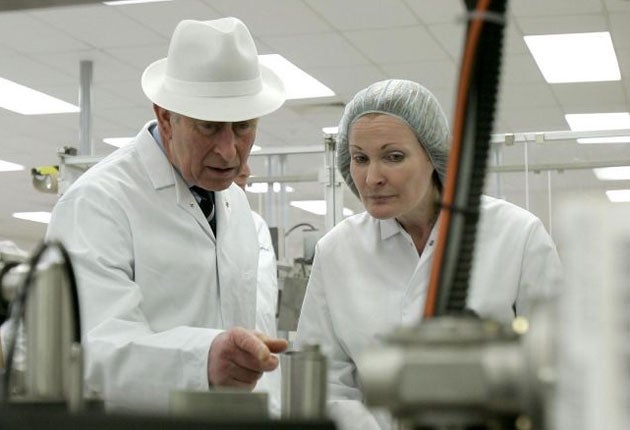Charles brings his herbal medicines to the high street
Duchy Originals range of treatments includes controversial Detox Tincture

Your support helps us to tell the story
From reproductive rights to climate change to Big Tech, The Independent is on the ground when the story is developing. Whether it's investigating the financials of Elon Musk's pro-Trump PAC or producing our latest documentary, 'The A Word', which shines a light on the American women fighting for reproductive rights, we know how important it is to parse out the facts from the messaging.
At such a critical moment in US history, we need reporters on the ground. Your donation allows us to keep sending journalists to speak to both sides of the story.
The Independent is trusted by Americans across the entire political spectrum. And unlike many other quality news outlets, we choose not to lock Americans out of our reporting and analysis with paywalls. We believe quality journalism should be available to everyone, paid for by those who can afford it.
Your support makes all the difference.The Prince of Wales attracted praise and ridicule yesterday for launching a range of herbal medicine in high street shops. Marketed under his Duchy Originals brand, the tinctures are made from plant extracts and said to relieve ailments such as colds, low moods, anxiety and indigestion.
Boots started selling the products this week and Waitrose will soon stock the range, which the Prince hopes will popularise the spread of complementary medicine. Duchy Originals said the products – priced at £10 each – provide "alternative and natural ways of treating common ailments".
Two of the products have been licensed for sale under the new EU traditional herbal medicinal products directive, officially classing them as medicines and representing the heir to the throne's first commercial move into health care. One is made from St John's Wort, which its label says has been traditionally used "to relieve the symptoms of slightly low mood and mild anxiety". A second is made from echinacea which has traditionally been used "to relieve symptoms of the common cold and influenza-type infections".
Duchy Originals says the active ingredients in its third product, Detox Tincture, artichoke and dandelion, are "cleansing and purifying herbs" which support the body's natural elimination of toxins.
Medical experts said there was some scientific support for the efficacy of St John's Wort and echinacea but the Detox Tincture is likely to be controversial since detox products have been repeatedly dismissed as worthless. Scientists say the liver successfully expels toxins, without external help.
Michael McIntyre, a leading herbalist, welcomed the products, saying they would bring consistent standards to a sector characterised by small and sometimes unreliable operators. "I'm delighted to have him involved," he said.
But the world's first professor of complementary medicine, Professor Edzard Ernst of Exeter University, attacked as "laughable" the latest effort of the Prince to support alternative cures, following his founding in 1993 of the Foundation for Integrated Healthcare (FIH).
Professor Ernst, who in the past called for the FIH to withdraw "misleading and inaccurate claims", said the move would not help respected herbalists. "Someone who doesn't understand science and medicine like Prince Charles can only damage the respectable side of herbal medicine."
Jeremy Laurance, Health Editor: Nature's way – if you can afford it
It is apt that the Prince of Wales should use his luxury Duchy Originals brand to launch a range of herbal medicines. The market has doubled in the past decade to over £200m and its growth almost exactly parallels that of luxury cars.
In Britain and the West, demand for alternative medicine is driven by increasing wealth (it will be interesting to see if it is maintained in the face of recession). In the rest of the world, the reverse is true – the poor depend on traditional herbal remedies and only the rich can afford Western pharmaceutical products that actually work. We in the West, for whom conventional medicines are easily available, have become complacent about their effectiveness and fearful about their side effects, expressed in a growing desire for "natural" remedies. But this rests on a misconception. "Natural" remedies only work because of the chemicals they contain.
For his first products, Prince Charles has played safe. St John's Wort is one of the few herbal remedies for which there is scientific evidence that it works as a treatment for depression. There is some evidence, too, that echinacea can prevent colds, though that is disputed.
In one respect, the Prince can relax – unlike many medicines, his products are unlikely to do harm. Except to people's wallets.
Join our commenting forum
Join thought-provoking conversations, follow other Independent readers and see their replies
Comments